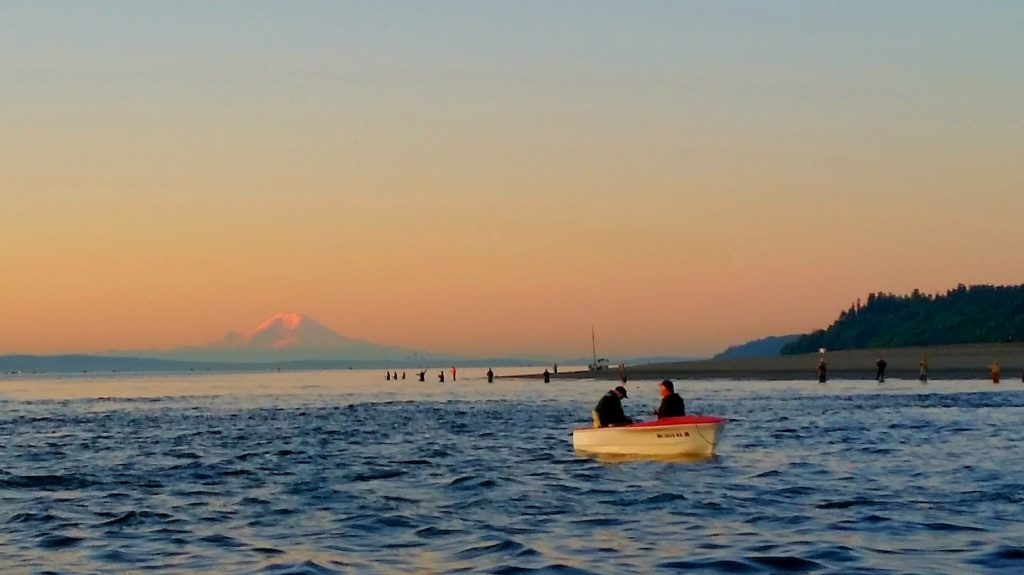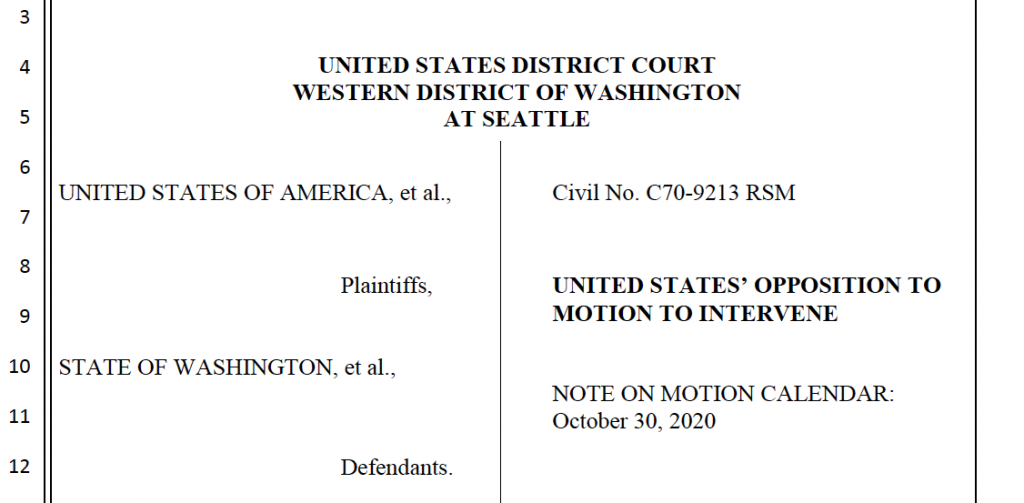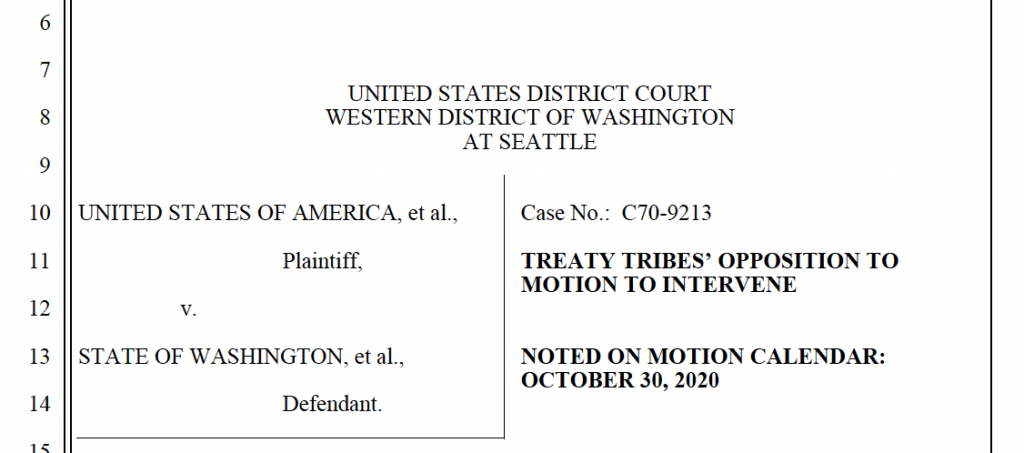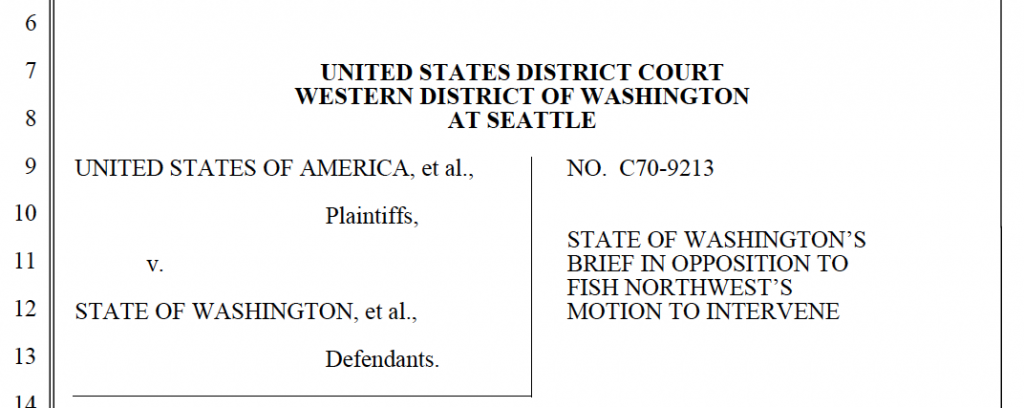
State, Feds, Tribes Ask Judge To Deny Anglers’ Bid To Become Boldt Party
As a North Sound sportfishing organization’s motion to become a party in the Boldt Decision begins to get more media coverage, state, tribal and federal attorneys are all asking a Western Washington judge to deny it, court documents show.
Fish Northwest early last month filed the bid in US District Court in Seattle to, in part, gain standing in the case and “enforce” its salmon-sharing provisions that are currently skewed out of their favor.

“It’s time to apply some pressure in this fashion, to say, ‘Hey, we want that pendulum back in the middle,'” is how FNW’s Mark Riedesel characterized the motion during a Fish Hunt Northwest interview during last Thursday evening’s show.
But briefs filed by the three primary parties in 1974’s ruling from Judge George H. Boldt essentially say that FNW and other sport anglers are represented by the state in negotiations with the many tribes and are not entitled to join the case.

“Permitting Fish Northwest to intervene would cause substantial prejudice to the existing governmental parties and their longstanding representations of their constituents. Such a precedent would upset the established norms and history of this case,” argued Judith Rabinowitz of the U.S. Department of Justice’s Environment and Natural Resources Division, Indian Resources Section.

Lawyers for the tribes say that a “long line of fishing groups” have tried to become parties to Boldt over the five-decade-long case, but “none have been allowed to, with Judges Goodwin, Boldt, Rothstein, and Rafeedie rejecting the very arguments FNW advances, including determining that ‘all citizens’ have no protectable interest supporting intervention. They have no such interest because the Stevens Treaties reserved the right to take fish to the sovereigns, who, to this day, hold that right and grant (or deny) privileges as they see fit.”

For its part, WDFW and the state of Washington do acknowledge the anger in the background over recent salmon season negotiations with the tribes that have led to sweeping winter Chinook fishing closures, which in particular affect FNW members like Riedesel, a charter skipper.

“We share with recreational anglers, including Fish Northwest, a deep concern over the decrease in Chinook salmon fishing opportunities in Puget Sound and a desire to improve fisheries and provide more harvestable salmon,” WDFW spokeswoman Carrie McCausland said via email this morning. “And, equitable sharing of the returns among tribal and non-tribal fisheries and increasing the numbers of Chinook salmon are important. However, the Fish Northwest request to join the federal government, the State of Washington, and the tribes as a party to U.S. v. Washington does not meet legal standards established by the court.”
That will be up to Judge Ricardo S. Martinez to decide in the coming weeks, but in the meanwhile the motion has pushed salmon catch disparities to the forefront.
Among FNW’s court filings was a declaration from Pat Patillo, who led WDFW negotiations with the tribes until his retirement several years ago. He states that this season’s Chinook split between treaty and nontreaty fishermen was forecasted to end up 62-38, respectively, several percentage points below recent years and producing a cumulative disparity of 124,696 fewer Chinook over the past four years.
Following a long history of suppression of treaty-guaranteed harvest rights by Washington, the Boldt Decision reaffirmed that salmon and steelhead were held “in common,” or equally, between the tribes and state.
FNW president Brett Rosson told the Skagit Valley Herald that the motion in federal court is not about overturning that ruling, rather enforcing its equity.
In response to WDFW and the state’s opposition to their motion, FNW countered that the judge should allow it to intervene because its “members’ interest in co-equal sharing of the salmon resource with the tribes is impaired by the WDFW’s mismanagement of the salmon resource including the State’s recent failure to even calculate the harvestable number of fish.”
They argue that it should not be up to Washington and treaty tribes to figure out if they’re complying with federal law – “That’s akin to two lions and a lamb voting on what’s for dinner” – and that Boldt, the Puget Sound Salmon Management Plan, and state and federal Administrative Procedures Acts must be complied with.
McCausland points to a range of factors that determine state salmon harvest.
“Fishery plans and resulting sharing of harvest between treaty and non-treaty fisheries take into account a world of weak stock management for ESA-listed salmon, differential impacts of fisheries in pre-terminal and terminal marine areas, guidance from recreational and commercial advisory groups, Fish and Wildlife Commission policies, and differences in methods used by treaty and non-treaty fisheries as a result of each party’s fishery priorities. The flexibility to realize a higher share of some stocks, balanced by a lower share in others, lets co-managers maximize the preferred fishing opportunities of each,” she said.
McCausland said that to address FNW’s concerns, WDFW, the tribes and others working are continuing efforts to recover Chinook and fishing opportunities, provide more info on catch sharing, bolster efforts to boost critical stocks and increase hatchery production where possible to benefit sport fisheries.
